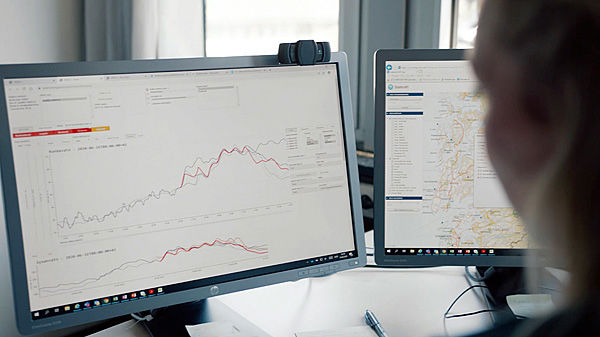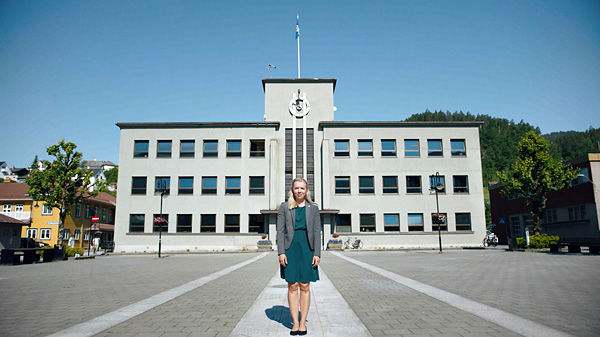Hydrologist at Statkraft, mother of five, deputy mayor and operator of a small farm. Sigrid Bojesen Fatnes is happy with every single drop of rain that falls from the sky.
How lucky we are to have water!
“If there’s one thing I’ve learned, it’s that you mustn’t complain about wet weather. You must rejoice over every single millimetre of rain! Water has a huge role to play in our lives,” says Statkraft hydrologist Sigrid Bojesen Fatnes.
Sigrid, who is also a mother of five and deputy mayor, and runs a small farm, lives and works in her small home town of Sauda, on the Norwegian west coast, where it pours down around 200 days a year.
“Think how incredibly lucky we are to have access to water. It gives us hydroelectric power, drinking water and lush countryside. And we don’t have to do a thing for it!

“It’s amazing to think that I’m helping to send renewable energy out along the power grid to lots of homes, both here in Norway and in Europe beyond,” Sigrid says.
Her job is to track the water from the moment it falls out of the sky until it passes through the power plants’ turbines.
“When we know how much water we can expect, we can apportion its use as effectively as possible for the benefit of Statkraft and society as a whole, and prevent flooding. The fantastic thing about hydropower is that it is flexible, which allows you to generate electricity when you need it,” she says proudly.
"I feel that a great responsibility comes with my job. Not only to provide sustainable electricity for future generations, but also to protect people’s immediate safety by predicting and preventing floods."
A new world
Sigrid and her husband Eirik Daniel moved back to Sauda some ten years ago. Back to the village, inhabiting a few thousand people, surrounded
by magnificent countryside, snow-clad mountains, untamed wild waterfalls and lush green slopes. Where Sigrid has run, bathed and played in since childhood.
In fact, this is the place they both grew up in. Back to the village that “feels like a town because its centre is compact and where everything is close at hand”.
The couple now run a small farm, with 30 sheep and eight suckler cows, that has been passed down through the family. Both sets of grandparents live just a stone’s throw away. It takes Sigrid ten minutes to cycle to work. Life is good.
Before they moved back home, they spent eight years in Bergen, where Sigrid studied meteorology and then worked as a meteorologist with the Norwegian Meteorological Institute’s Forecasting Division for Western Norway. When Statkraft advertised for a hydrologist to work in her home village, everything fell into place and the family moved back. Statkraft’s regional office for southern Norway, which is located in Sauda, employs around 40 people.
“When I moved back, a whole new world opened up for me, with a substantial scientific community. It’s great that there was such an exciting workplace here in Sauda. It can be challenging to find work for two highly educated home-comers, but my husband and I have been really lucky.”
Multiple roles
Sigrid is a busy woman. One with lots of lists, yellow post-it notes, high ambitious goals and long days.
Her children are sitting around the family dining table: Sivert (1), Tarjei (5), Eirin (7), Liva (10) and Ingrid (13). They are used to the conversation ranging from hydropower and climate change to the local community, leisure activities and the importance of jobs to the village’s future. Or conversations about choir and piano practice, handball and football training. Or about calves, lambing, cow manure and animal husbandry.
“It’s totally non-stop. My different roles blend into each other and it’s not often I get to relax on the sofa,” laughs Sigrid, who is deputy mayor in the municipality of Sauda.

“Politics has a lot to do with what is going on around us, and is much more rewarding and inspiring than you might think. It is here that I can help to plot Sauda’s future course,” Sigrid says.
“But being an elected official is not always easy. Engagement in the working environment, society and politics has brought me into situations that I’ve not always been comfortable with. But I have faith in my own beliefs and opinions and the courage to stand up for them, even when things get a bit stormy. I recognise that nothing is really that dangerous. At the end of the day, we’re all just people.”
"In my job, I see the cycle of nature up close. We know and see with our own eyes that the climate is changing more than is normal. The weather is becoming wilder and more intense, and that goes for both wet and dry periods. Being part of Statkraft, which is important for tomorrow’s green energy, makes me feel very proud!"
Making a difference
Sigrid has a deep commitment to the fight against climate change and is proud of the work she does as a hydrologist in Statkraft.
Asked how she manages to do it all, Sigrid smiles.
“I don’t,” she admits.
“When I feel exhausted, it can be a challenge. I often have busy days when I don’t accomplish everything I’d planned, and working in the evenings is not always a tempting prospect. But it is worth it, because I learn a lot from being challenged, not least about myself as a person.”
Sigrid says that she enjoys life most when she gets things done and can see that the children are thriving.
And what drives her?
“Making a difference. If my contribution can nudge things a little bit in the right direction, I feel that I have achieved something,” she says.
“No one can do everything by themselves, but everyone can do something.”
Meet our people

We‘re lucky to have water
Hydrologist at Statkraft, mother of five, deputy mayor and operator of a small farm. Sigrid Bojesen Fatnes is happy with every single drop of rain that falls from the sky.
Read more

Clean energy for Brazil
A culture of entrepreneurship and the ability to seize ever new opportunities means that he cannot imagine a better company to work for – whether the workplace is in Norway, Germany or Brazil.
Read more

Hacking our own assets
Paulina Waltila is helping to solve the climate crisis in her own way. Her job is to protect Statkraft against cyber attacks and help the company secure important assets and the production of re...
Read more

Analyzing weather forecasts
“It’s exciting to get up every day and check whether yesterday’s weather forecast was correct,” says Vidar Fossøy, head of section at Statkraft’s regional office in Gaupne, Norway. He has an...
Read more

Every single dam is unique
“Dams are beautiful,” says Abha Dudhraj. Hydropower has long been part of her life – ever since she visited her father at work in Nepal when she was a child. Decades later, Abha herself has become a...
Read more

About Statkraft and hydropower
Did you know that Statkraft has 347 hydropower plants in Norway and abroad? In Norway, 90 percent of all power production comes from hydropower. Worldwide, hydropower accounts for around one-sixth of total power production.